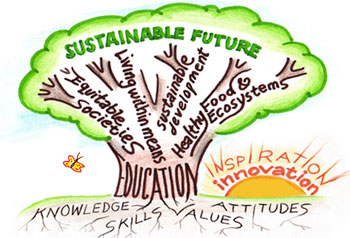Leave it to the wildly successful US Green Building Council which turned one of the biggest, dirtiest industries significantly greener, to launch another massive project on our wish list: a National Action Plan for Educating for Sustainability.
Its goal: all students are educated for a sustainable future by 2040 through the integration of environment, economy and equity, with the ability to apply systems thinking to problem solving and decision-making.
"Education for Sustainability (EfS) empowers students to make decisions that balance the need to preserve healthy ecosystems with the need to promote vibrant economies and equitable social systems for all generations to come," they say.

credit: CELF Environmental Literacy
In partnership with global education leader Houghton Mifflin Harcourt, the action plan outlines a strategy for all 50 states to adopt a comprehensive green schools policy that includes a graduation requirement around sustainability literacy by 2040.
"When the U.S. Department of Education published its Green Ribbon Schools award which called for all K-12 graduates to be environmentally literate, we received
that as a directive for the community to band together and figure out how we
will ensure that happens," says Rachel Gutter, director of the Center for Green
Schools at USGBC.
This year, the groundwork is being laid by forming working groups, an online communications platform, creating a funding campaign, and sharing/ distributing best case models and materials. By June, they will establish the US Teacher Education for Sustainable Development Network.
The goal for 2015 is for EfS-related content to be included in the next revision of the ISLLC 2008 Standards for educational leadership, used by state policymakers to set high-level standards.
By 2020, EfS coaches should be available for all school districts and by 2023, sustainability professions should commonly be members of leadership teams in school districts. The following year, EfS will be embedded into the process of learning to be a teacher.
In 2025, the goal is for 35 states to have a comprehensive green schools policy, which includes an EfS graduation requirement, and by 2030, all state boards of education have adopted teacher evaluation standards grounded in EfS.
"Sustainability Education and Environmental Education are mature fields of inquiry. We have Benchmarks and Big Ideas and we are ready for large scale systemic integration and alignment with the nation’s Next Generation Science Standards, The Common Core, STEM and STEAM. I think the sustainability education community has what it takes and The National Action Plan can serve as a catalyst to instigate the next cycle of educational life for our children," says Jamie Cloud, founder of Cloud Institute for Sustainability Education.
We’re not sure if there’s a relationship, or what the status is, but in 2009, Australia’s government launched the second National Action Plan for Education for Sustainability, with a goal of equipping all citizens with the knowledge and skills required to live sustainably. It builds on the first plan, which launched in 2000.
Learn more about the US plan:

 Loading...
Loading...
Teaching and inspiring children to participate in a sustainable future is vital. Thank you for your fine work.
Here’s a new K – 6 you might be able to offer your classroom.
It’s a video, “The Three Friends and Climate Change,” inspired by the
“The Three Little Pigs.” https://www.youtube.com/watch?v=NNRfykVNEe0
It’s a short adventure story about climate change and sustainability that teaches and stimulates conversation about these important issues.
Please let me know if it interests you and if you’d like to share it.